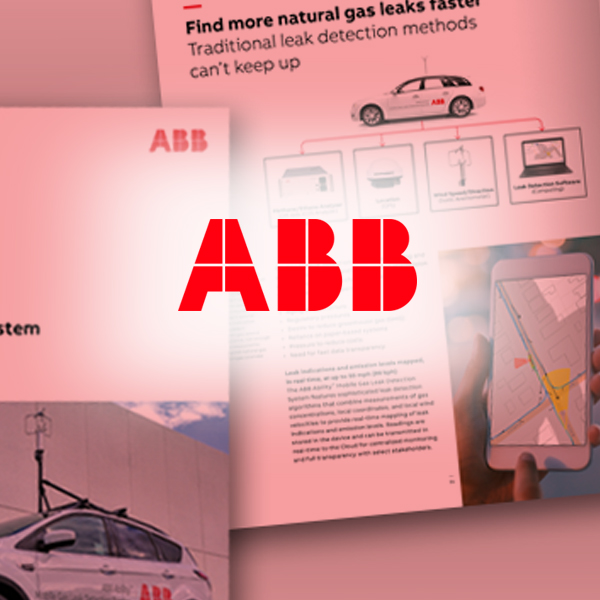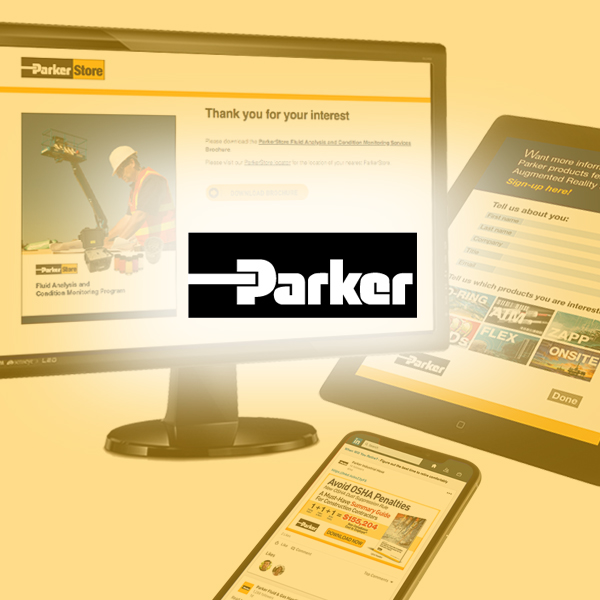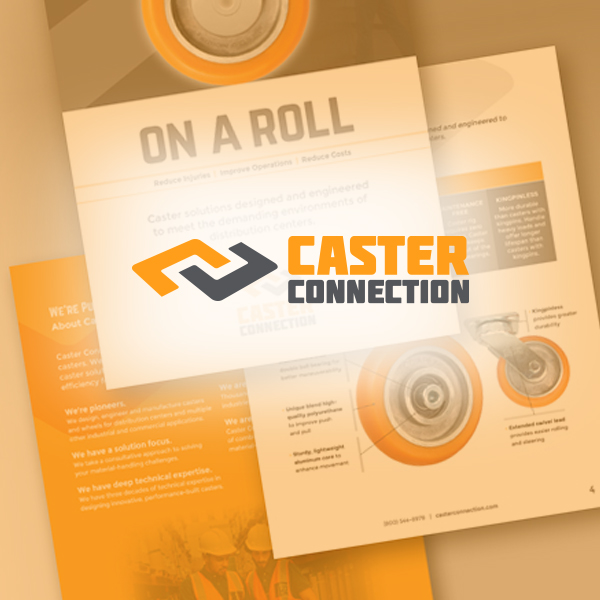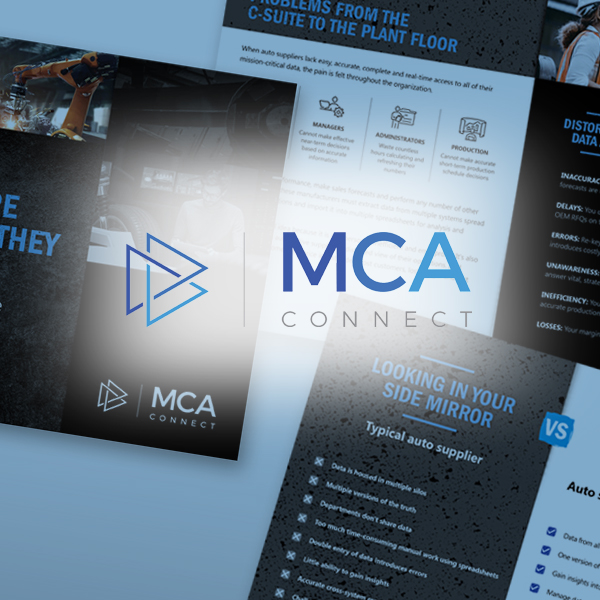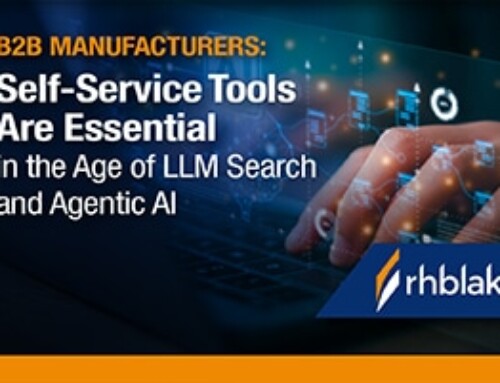What Is a Good Domain Authority for Semiconductor Manufacturers?
Your semiconductor company may not be a Fortune 500 giant, but your online presence needs to perform like one. Why? Because your prospects aren’t just sizing you up against companies your own size. They’re comparing your digital presence to the most recognizable names in your industry. And more often than not, that comparison starts online.
In today’s buyer journey, your website—not a call, not an email, and not a trade show handshake—is the first conversation. Buyers are evaluating you silently, through your site and your digital footprint. If you don’t show up in their search results (or worse, show up looking outdated) you’re out of the running before you even know you were being considered.
That’s why your visibility in search engines and AI tools like ChatGPT and Copilot matters more than ever. And one of the clearest indicators of that visibility is your Domain Authority (DA).
What Is Domain Authority
Domain Authority is a score developed by Moz that estimates how likely your website is to rank in search results. It ranges from 0 to 100, with higher scores reflecting stronger authority. It’s based on several factors, including:
- The number and quality of backlinks pointing to your site
- The number of unique referring domains
- The trustworthiness and relevance of your content
- Technical SEO aspects like crawlability and site structure
While Google doesn’t use Domain Authority directly, it’s a reliable proxy for how search engines and AI platforms assess your credibility, and how likely you are to appear in results and be cited.
Doman Authority is one of several key authority metrics used by top SEO platforms. The others are Domain Rating (Ahrefs), Authority Score (Semrush) and Page Authority (Moz). Each has its own scoring model, but all point to the same goal: to measure how trustworthy, credible, and competitive your website is in the digital landscape.
What Should Your Goal Be?
If you’re a semiconductor manufacturer, aim to build a Domain Authority of 41 or higher, especially if your competitors are investing in digital. Improving your score means your content is more likely to be found, trusted and referenced by both search engines and AI-powered platforms. In a world where digital is your first impression, authority is visibility. And visibility is opportunity.
Benchmarking Domain Authority in Semiconductor Manufacturing
At RH Blake, we recently researched the top 140 semiconductor manufacturers by market cap. We found that the average Domain Authority among these companies is 47.3.
This means, if you want to compete for visibility, especially against large industry players, your website must score in this range. Otherwise, your site may be overlooked not just by Google, but also by the AI tools your prospects are using to research solutions.
For example, how do you rank against these top-tier semiconductor manufacturers?
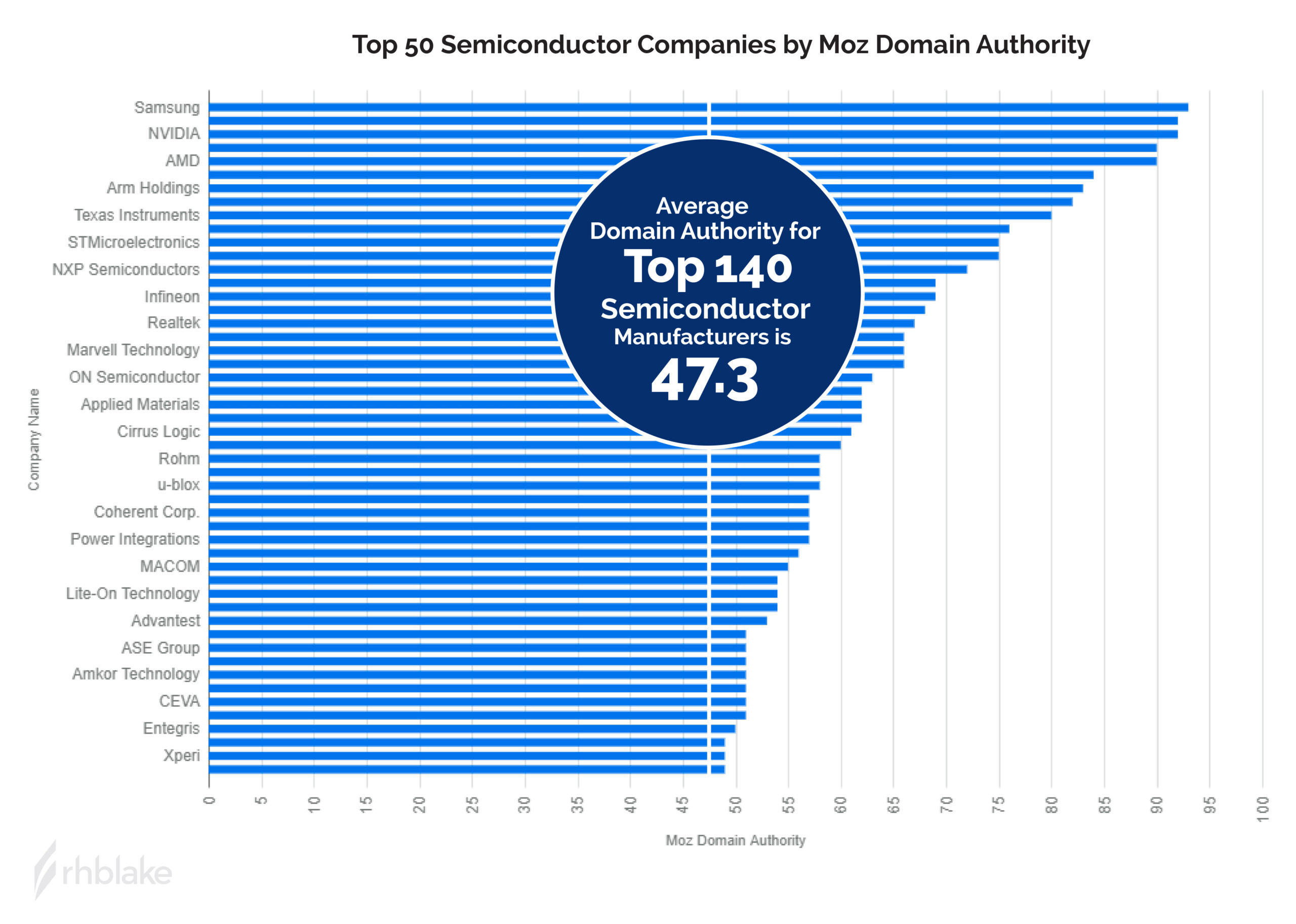
This chart illustrates a clear and compelling trend: among the top 50 semiconductor manufacturers, strong digital authority is the norm, not the exception. Each of these companies scores above the industry average Domain Authority of 47.3, placing them well ahead of the broader pool of 140 semiconductor firms.
The companies represented here show Domain Authority scores ranging from the high 40s to the mid-90s, with many clustering in the 65–95 range. That upper tier reflects exceptionally high levels of online trust and search performance.
Even the companies at the lower end of this top-50 list maintain Domain Authority scores near or above 50, solidly outperforming the average. This tells us that to compete with the industry’s most prominent players, a Domain Authority above 47 isn’t just helpful—it’s essential.
The takeaway is clear: digital visibility is now a key competitive differentiator. For semiconductor companies looking to increase brand awareness, attract top talent, or influence buyer decisions, investing in SEO, high-quality content, and strategic backlinking is now essential foundational. In an era where search engines and AI tools reward authoritative sources, your ability to be found (and trusted) starts with your Domain Authority.
What Do Domain Authority Scores Mean?
Here’s a quick breakdown of how to interpret your Domain Authority:
- 1–20: New or low-authority websites. Still building trust.
- 21–40: Modest authority. Sites at this level may rank for niche terms.
- 41–60: Strong domain. Often found on page one of search results.
- 61–80: Highly authoritative. Trusted sources within their industry.
- 81–100: The highest authority. Global brands and major media outlets.
Why Domain Authority Deserves a Front-Seat in Your Marketing Strategy
Two powerful trends are making Domain Authority a critical metric for semiconductor manufacturers.
1. Search Engines Are Doubling Down on Credibility
While Google has always factored in authority, recent algorithm updates have made credibility a central ranking signal. The rollout of the EEAT framework—Experience, Expertise, Authoritativeness, and Trustworthiness—means websites must now prove not just relevance, but also reliability.
High Domain Authority websites are:
- More likely to rank on the first page for competitive keywords
- More frequently featured in search snippets and answer boxes
- Crawled and indexed more consistentlylarly
If your rankings are slipping and your content isn’t getting discovered, a low Domain Authority may be a key reason.
2. AI Tools Are Elevating Trusted Sources
AI-powered research assistants like ChatGPT, Perplexity, Gemini, and Copilot increasingly pull data from high-authority websites when generating responses. Even if your SEO is in good shape, you could be invisible in these emerging tools if your site lacks credibility signals.
This matters more with each passing year. According to Gartner, 30% of B2B buyers will rely on AI to help make purchasing decisions by 2026. If your brand isn’t surfacing in AI-powered research, it’s likely being left out of the consideration set entirely.
What Drives Domain Authority for Semiconductor Manufacturers?
To improve your Domain Authority, focus your efforts on three foundational areas: trusted backlinks, technical site health, and high-value content.
1. Earn Backlinks from Reputable Sources
The single most important factor for improving Domain Authority is earning backlinks from credible, relevant websites. These aren’t just any links, though. They’re endorsements from organizations your buyers already trust, such as:
- Trade journals and industry news outlets
- Associations and standards bodies
- Vendor and distributor websites
- University research centers and government agencies
- Product directories and databases
- Strategic partners and suppliers
Each high-quality backlink serves as a vote of confidence, signaling to both search engines and AI models that your content is trustworthy.
2. Strengthen Technical SEO
Search engines favor websites that are clean, fast, and easy to navigate. That means fixing crawl errors, optimizing for mobile, eliminating duplicate content, and ensuring pages load quickly. Use tools like Google Search Console or Screaming Frog to uncover and resolve technical issues that may be holding your site back.
Improving site performance enhances your Domain Authority, and it also boosts user experience and conversion rates.
3. Publish Authoritative, Original Content
If you want your site to be seen as a go-to resource, you need to publish content worth citing. That means:
- In-depth blog posts backed by data
- Research reports and market analysis
- Expert commentary on industry trends
- Practical whitepapers and technical guides
This kind of content attracts backlinks organically, keeps visitors engaged longer, and helps position your team as a trusted voice in your industry.

4. Promote and Measure What Matters
Creating valuable content is just the beginning. If no one sees it, it won’t earn links or build authority. Make promotion a key part of your strategy. Share each piece through your email list, social channels, industry forums, and partner networks to maximize reach and engagement.
5. Track Your Progress and Know Where You Stand
Improving Domain Authority requires visibility into your performance and how it compares to the competition. Start by using trusted SEO platforms like Moz, Ahrefs or Semrush. These tools give you a comprehensive look at your:
- Domain Authority score
- Backlink profile
- Number of referring domains
- Keyword visibility and rankings
They also let you benchmark your performance against industry peers so that you know exactly where you stand in the digital landscape.
Once you establish a baseline, set clear, achievable goals. Review your progress quarterly. You might aim to:
- Earn a set number of quality backlinks
- Grow your number of referring domains
- Improve rankings for high-value keywords
Consistent tracking lets you double down on what’s working, pivot when needed, and stay ahead of shifts in search algorithms or buyer behavior.
Beyond Domain Authority itself, keep an eye on related metrics like organic traffic, bounce rates, and session duration. These help you understand not just how well your content ranks, but how effectively it engages your audience.
Remember: building Domain Authority takes time. Progress may be steady rather than steep, but with ongoing analysis and promotion, you’ll be building a stronger, more resilient online presence every step of the way.
How to Improve Your Domain Authority
Building Domain Authority takes time, but it’s one of the most valuable digital investments you can make. Here’s how to get started:
- Build high-quality backlinks
- One of the most effective ways to increase your Domain Authority is by building high-quality backlinks from trusted industry sources. Start by reaching out to industry publications and offering expert commentary or thought leadership articles. These outlets are always looking for authoritative voices and can be a great source of referral traffic.
- You should also list your business in reputable manufacturing directories, which not only improve your online presence but also provide valuable inbound links.
- Consider forming partnerships with universities or research organizations to collaborate on whitepapers or case studies. These partnerships often result in backlinks from highly credible domains.
- Actively promote your content on LinkedIn and in relevant industry forums where your target audience is engaged. The more your content is seen and shared, the more likely it is to earn organic links.
- Publish better content
Improving your Domain Authority also requires publishing content that is informative, relevant, and trustworthy.- Focus on creating materials that demonstrate depth, subject-matter expertise, and clear insights. High-quality content not only helps with SEO but also builds your credibility with prospects. Incorporate original research, case studies, or firsthand observations to provide unique value that can’t be found elsewhere.
- Align your content topics and formats with the questions and challenges your target buyers face during their decision-making process.
- Revisit and update older posts to keep them relevant. Refreshing content with new data, updated strategies or improved formatting can boost its performance and keep it visible in search results.
- Strengthen your technical SEO
Technical SEO plays a foundational role in how search engines access, understand, and rank your website.- Begin by using tools like Google PageSpeed Insights to evaluate and improve your site’s loading speed, which affects both user experience and search rankings.
- Ensure your site is fully mobile-responsive, as a growing share of B2B searches now happen on smartphones and tablets.
- Fix any broken links, duplicate content, or crawl errors that could prevent search engines from properly indexing your pages.
- Create a clean site structure with clear internal linking to help both users and bots navigate your content easily. A well-optimized site not only supports higher rankings but also signals professionalism and credibility to your visitors.
- Promote Your Content
Remember, great content doesn’t earn links unless people see it. Use your email list, social channels, industry groups and partnerships to promote each piece. - Track Progress and Benchmark Competitors
To make meaningful progress in improving your Domain Authority, it’s essential to consistently monitor your performance and benchmark it against competitors.- Start by using trusted SEO tools like Moz, Ahrefs or Semrush, which offer detailed insights into your Domain Authority score, backlink profile, referring domains, and keyword visibility. These platforms also allow you to track how your authority stacks up against your direct and indirect competitors, helping you understand where you stand in the digital landscape of your industry.
- Once you’ve established a baseline, set realistic, measurable goals for improvement. A good practice is to review your progress on a quarterly basis. For example, you might aim to earn a certain number of high-quality backlinks, increase the number of referring domains, or improve rankings for a set of priority keywords each quarter. Regular tracking allows you to identify what’s working, make data-driven decisions, and adjust your strategy in response to changes in the market or Google’s algorithms.
- In addition to tracking Domain Authority itself, monitor related metrics, like organic traffic, bounce rate, and average session duration, to get a fuller picture of how your content is performing. Remember that increasing Domain Authority is a long-term effort. Progress may be gradual, but consistent effort and regular analysis will help you build a stronger, more competitive online presence over time.
Domain Authority and Your Competitive Edge
In today’s semiconductor manufacturing landscape, your website can no longer afford to be a simple digital catalog. Your website is now a credibility checkpoint. Buyers, engineers, distributors, investors and partners are evaluating your business long before they ever make contact. And if your Domain Authority trails far behind that of your competitors, you may not even make it onto their radar.
Think of Domain Authority as your digital reputation score. A higher score signals trust, not just to search engines and AI tools, but to the decision-makers who rely on them. In a market where visibility equals opportunity, strong Domain Authority gives you a measurable competitive advantage.
And this brings us to your Domain Authority score.
If you want to stand shoulder to shoulder with the top manufacturers in your space, you need to be visible where your buyers are searching. That starts with strengthening your Domain Authority.


Here’s how to get started:
- Assess your current Domain Authority using tools like Moz, Ahrefs or Semrush
- Compare your score against key competitors and industry benchmarks
- Prioritize the fundamentals: earn high-quality backlinks, publish authoritative content, and resolve technical SEO issues
A Domain Authority score of 47 or higher places you in the competitive tier of the top 140 semiconductor manufacturers. If you’re not there yet, we can help. At RH Blake, we help semiconductor manufacturers increase their visibility, credibility, and influence through strategic, results-driven thought leadership. Let’s connect and build the digital authority your business needs to lead.

"You guys met our expectations in every way. It [RH Blake Market Research] was the information we were looking for. Congratulations and Thank You!"
 Scott Griggs
Scott Griggs
Director of Services for Food Manufacturing and Food Service
ALS Global

"“I’ve gotten all that I’d hoped for from the RH Blake Growth Roadmap™ and more. Based on the research and insights, we adjusted our offering scope and sales approach. And this adjustment has been effective at generating new opportunities."
 Diane Reko
Diane Reko
President
REKO International

"RH Blake has been an outstanding partner. They deliver creativity, on time, and always so professional. We love working with them because of their perspective, support, and their efficiency in turning projects around quickly."
 Samantha Spano
Samantha Spano
Digital Product Marketing & Communications Manager
Industrial Automation Energy Industries
ABB
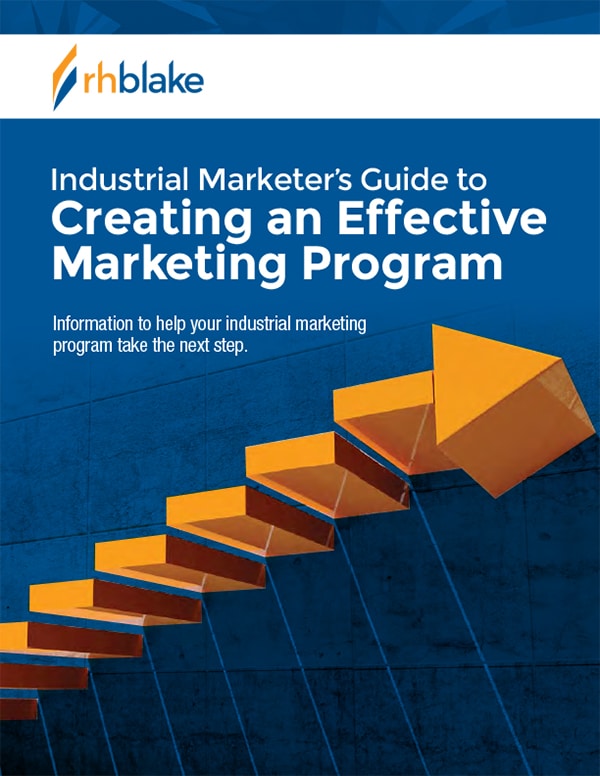
Industrial Marketer’s Guide to Creating an Effective Marketing Program
147 pages of actionable ideas to help you create a winning marketing strategy and program

Industrial Marketer’s Guide to Creating an Effective Marketing Program
147 pages of actionable ideas to help you create a winning marketing strategy and program
Related Clients



